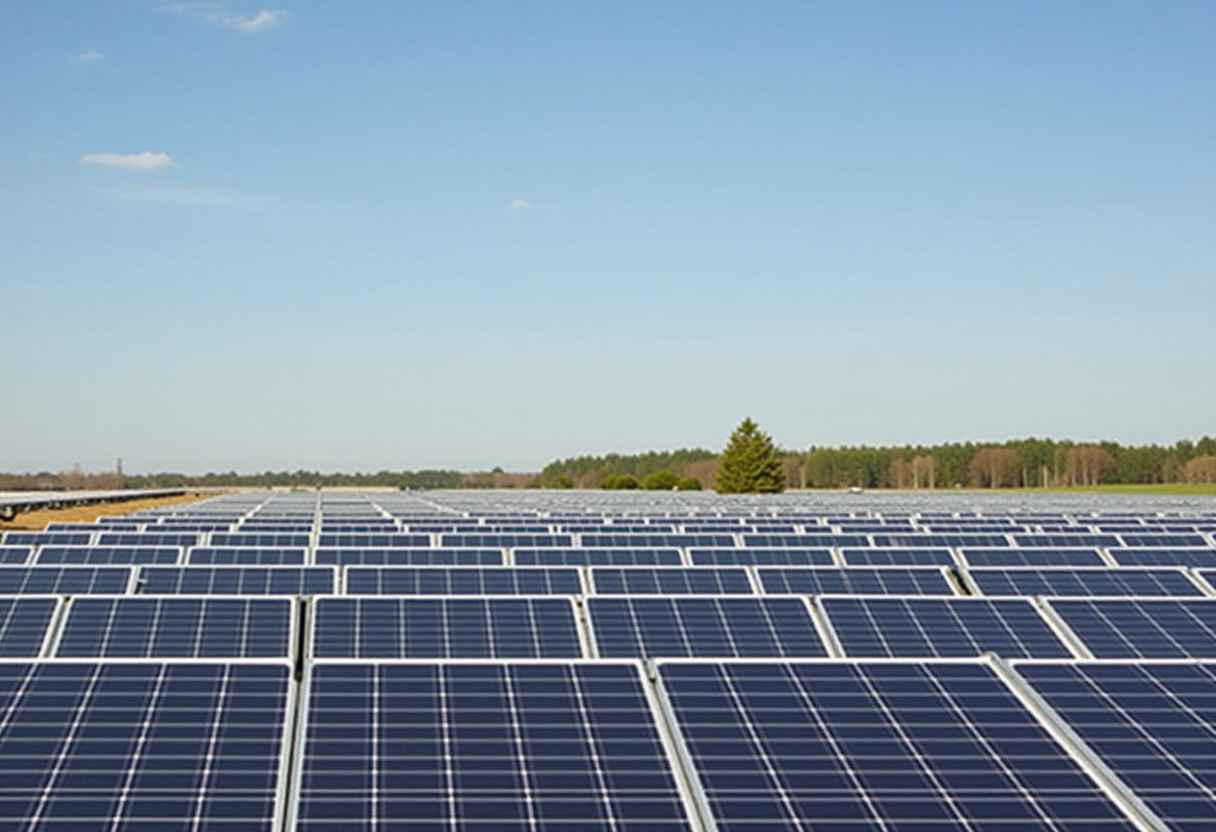Spilltekno – In recent months, the solar industry has been shaken by news surrounding Aurora Solar layoffs. As a company that has long been a beacon of innovation in renewable energy solutions, these layoffs have sparked widespread concern among employees, stakeholders, and industry observers alike.
For you, whether you’re an employee, investor, or simply someone interested in the future of clean energy, understanding the implications of these layoffs is crucial.
This article will delve into the reasons behind the workforce reductions, their potential impact on Aurora Solar’s operations, and what this means for the broader solar industry.
By exploring expert opinions, analyzing market trends, and examining the company’s strategic decisions, we aim to provide a comprehensive overview of the situation.
You’ll gain insights into how these layoffs fit into the larger narrative of technological advancements and economic shifts within the renewable energy sector. Let’s explore together what lies ahead for Aurora Solar and its role in shaping the future of solar energy.
The Reasons Behind Aurora Solar Layoffs

To truly grasp the significance of the Aurora Solar layoffs, it’s essential to examine the factors driving these workforce reductions. Industry experts suggest that the decision likely stems from a combination of internal restructuring needs and external market pressures.
One prominent reason could be the company’s effort to streamline operations as it navigates a highly competitive solar market.
With advancements in technology reshaping the industry, Aurora Solar may be reallocating resources toward automation and artificial intelligence-driven tools, which can reduce reliance on manual labor.
Additionally, global economic uncertainties have placed pressure on companies across all sectors, including renewable energy.
Rising interest rates, fluctuating material costs, and supply chain disruptions have created financial headwinds that could force even innovative firms like Aurora Solar to make tough decisions.
A report from the Solar Energy Industries Association (SEIA) highlights how macroeconomic challenges have slowed growth in the solar sector, prompting businesses to reassess their cost structures.
Another factor could be shifting customer demands. As more organizations adopt solar solutions, the need for scalable, tech-forward services has grown.
To meet these expectations, Aurora Solar might be prioritizing investments in software development and digital platforms over traditional workforce expansion. By focusing on cutting-edge tools, the company aims to enhance efficiency and maintain its competitive edge.
These strategic pivots, while necessary for long-term sustainability, often come at the expense of jobs in the short term.
Ultimately, the layoffs reflect a broader trend in the renewable energy sector: the delicate balance between innovation and workforce stability.
While painful for those affected, such moves are often seen as critical steps for companies striving to adapt to an ever-evolving landscape. Understanding these dynamics provides valuable context for anyone following Aurora Solar’s journey.
The Ripple Effect of Aurora Solar Layoffs on Employees and Stakeholders

The Aurora Solar layoffs have sent shockwaves through the lives of employees and stakeholders, leaving a profound emotional and financial toll in their wake. For many workers, the sudden loss of employment has not only disrupted their livelihoods but also shattered their sense of security.
Stories from former employees reveal the human side of these layoffs—parents struggling to cover household expenses, young professionals questioning their career paths, and long-time team members grappling with the loss of a workplace they once called home.
One former employee shared how the announcement came without warning, leaving them scrambling to update resumes and seek new opportunities in an increasingly competitive job market.
Beyond the immediate financial strain, the layoffs have also taken a psychological toll. Many employees reported feelings of anxiety, self-doubt, and uncertainty about their futures.
The abrupt nature of the layoffs compounded the stress, as individuals were left with little time to prepare for the transition. Some described the experience as demoralizing, particularly after years of dedication to a company they believed was committed to advancing sustainable energy solutions.
Stakeholders, too, have been deeply affected. Investors are now questioning the long-term viability of Aurora Solar’s strategies, especially given the layoffs’ potential to disrupt ongoing projects and client relationships.
Clients who rely on Aurora Solar’s services are concerned about delays or reduced quality of support, which could impact their own operations. Meanwhile, industry partners worry about the broader implications for collaboration and innovation within the renewable energy sector.
These firsthand accounts underscore the far-reaching consequences of workforce reductions. While layoffs are often framed as a business necessity, the personal stories of those impacted serve as a stark reminder of the human cost behind such decisions.
For employees and stakeholders alike, the road to recovery will require resilience, adaptability, and a renewed focus on rebuilding trust and stability.
Broader Implications for the Solar Industry

The Aurora Solar layoffs cast a long shadow over the solar industry, signaling potential shifts that could ripple through the entire renewable energy sector. One significant implication is the growing emphasis on automation and artificial intelligence (AI).
As Aurora Solar reallocates resources toward advanced technologies, other companies may feel compelled to follow suit, accelerating a trend toward tech-driven solutions.
This shift could lead to increased efficiency in project management, design, and installation processes, but it also raises concerns about the displacement of skilled labor.
For instance, roles traditionally performed by engineers and technicians may become obsolete as AI-powered tools take over repetitive or data-intensive tasks.
Moreover, the layoffs highlight the precarious nature of the solar industry amid economic volatility. Fluctuations in government incentives, trade policies, and global supply chains have already created instability for solar companies.
The Aurora Solar layoffs underscore how vulnerable even well-established firms can be when faced with rising operational costs and shrinking profit margins.
This vulnerability could prompt competitors to adopt more conservative hiring practices or delay expansions, potentially slowing the industry’s overall growth trajectory.
On a positive note, these layoffs may spur innovation as companies seek to differentiate themselves in a crowded market. Smaller firms or startups could seize the opportunity to fill gaps left by larger players, offering specialized services or niche solutions.
Additionally, the focus on digital transformation may encourage collaboration between tech companies and solar firms, fostering new partnerships that drive progress in renewable energy.
For consumers, the impact could be mixed. On one hand, advancements in technology may lead to lower costs and improved accessibility of solar solutions. On the other hand, reduced competition or workforce shortages could result in longer wait times or higher prices for installations.
Ultimately, the Aurora Solar layoffs serve as both a cautionary tale and a catalyst for change, reminding the industry of the delicate balance between innovation and workforce sustainability.
Expert Opinions and Predictions: Navigating the Aftermath of Aurora Solar Layoffs
Industry analysts and thought leaders have weighed in on the Aurora Solar layoffs, offering diverse perspectives on what this development could mean for the company and the broader solar sector.
Dr. Emily Carter, a renewable energy strategist at GreenTech Insights, emphasizes that while layoffs are undoubtedly challenging, they may position Aurora Solar for long-term resilience. “This move reflects a strategic pivot toward automation and digital tools,” she explains.
“By investing in AI-driven platforms, Aurora Solar is aligning itself with the future of the industry, where scalability and efficiency are paramount.” However, Dr. Carter warns that such transitions must be managed carefully to avoid alienating both employees and clients during the adjustment period.
Conversely, Mark Thompson, a senior analyst at Solar Market Dynamics, expresses concerns about the broader implications of workforce reductions. “While automation can enhance productivity, it risks creating a skills gap in the industry,” he notes.
“If companies like Aurora Solar don’t invest in retraining programs or upskilling initiatives, we could see a shortage of qualified professionals capable of bridging the gap between traditional methods and emerging technologies.”
Thompson predicts that this could lead to slower adoption rates of solar solutions, particularly in regions with limited access to advanced training resources.
Other experts highlight the potential for Aurora Solar to emerge stronger post-layoffs. Sarah Lin, CEO of Solar Futures Group, points out that similar restructuring efforts have historically allowed companies to refocus on core competencies.
“Aurora Solar’s decision to streamline operations could enable them to double down on software innovation, which is a key differentiator in today’s market,” she says. Lin also anticipates a wave of consolidation within the industry, as smaller firms struggle to compete with tech-savvy giants. “We might see mergers or acquisitions as companies seek to combine strengths and navigate economic uncertainties.”
Despite differing viewpoints, most analysts agree that transparency will be critical moving forward. Publicly addressing the rationale behind the layoffs and outlining plans for future growth could help restore confidence among stakeholders.
As Aurora Solar charts its path ahead, these expert insights underscore the importance of balancing innovation with workforce stability—a challenge that will define not only the company’s success but also the evolution of the solar industry as a whole.
Supporting Affected Employees: Resources and Strategies for Moving Forward
For those impacted by the Aurora Solar layoffs, navigating the transition can feel overwhelming, but there are practical steps you can take to rebuild and thrive. First, leverage available resources designed to assist displaced workers.
Many states offer unemployment benefits, career counseling, and job placement services specifically tailored to individuals in the renewable energy sector. Websites like CareerOneStop, sponsored by the U.S.
Department of Labor, provide tools to identify local training programs and connect with potential employers. Additionally, professional organizations such as the Solar Energy Industries Association (SEIA) often host job boards and networking events that can help you stay connected within the industry.
Upskilling is another critical strategy to remain competitive in a rapidly evolving job market. Consider enrolling in online courses or certification programs focused on emerging technologies like artificial intelligence, machine learning, or advanced solar design software.
Platforms like Coursera, LinkedIn Learning, and edX offer affordable options to expand your skill set. If finances are a concern, look for grants or scholarships aimed at supporting workers in the green energy field.
Upskilling not only enhances your employability but also positions you to take advantage of new opportunities created by the industry’s shift toward automation.
Networking remains one of the most effective ways to uncover hidden job prospects. Reach out to former colleagues, join industry-specific groups on LinkedIn, and attend virtual or in-person conferences to expand your professional circle.
Sharing your story and staying active in the community can open doors to unexpected opportunities. Remember, resilience is key—while layoffs are undeniably challenging, they can also serve as a catalyst for growth and reinvention.
By taking proactive steps and utilizing available resources, you can turn this setback into a stepping stone toward a brighter future.
Looking Ahead: Lessons Learned and Opportunities for Growth
As we reflect on the Aurora Solar layoffs, it’s clear that this event underscores the delicate balance between innovation and workforce stability in the renewable energy sector.
While the layoffs were undoubtedly a challenging chapter for employees and stakeholders, they also highlight the critical need for companies to adapt to technological advancements and economic pressures.
For Aurora Solar, this period of restructuring could pave the way for a stronger, more resilient organization—one that leverages cutting-edge tools to deliver scalable solutions while maintaining its commitment to sustainability.
For you, whether you’re an industry professional, investor, or advocate for clean energy, this moment serves as a reminder of the importance of staying informed and adaptable.
The solar industry is evolving rapidly, and those who embrace change while advocating for ethical practices will be best positioned to thrive. If you’ve been impacted by similar challenges or are curious about the future of renewable energy, we invite you to share your thoughts in the comments below.
Your voice matters, and together, we can foster meaningful conversations about building a sustainable future. Don’t forget to explore our other articles for deeper insights into the trends shaping the solar industry and beyond. Spilltekno
Simak update artikel pilihan lainnya dari kami di Google News dan Saluran Whatsapp Channel Spilltekno












